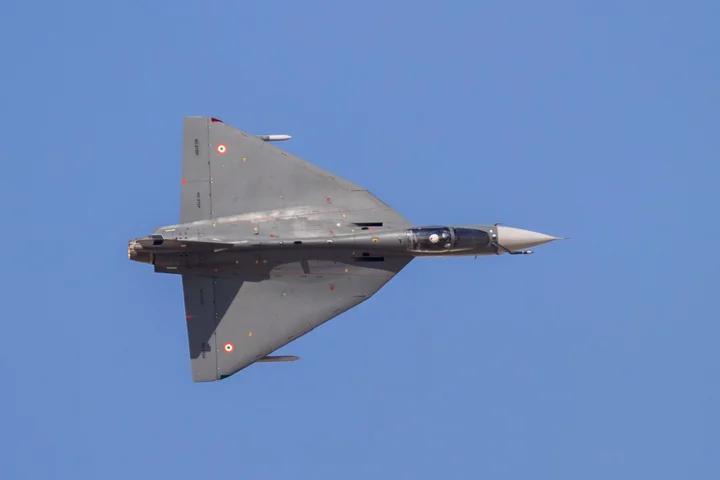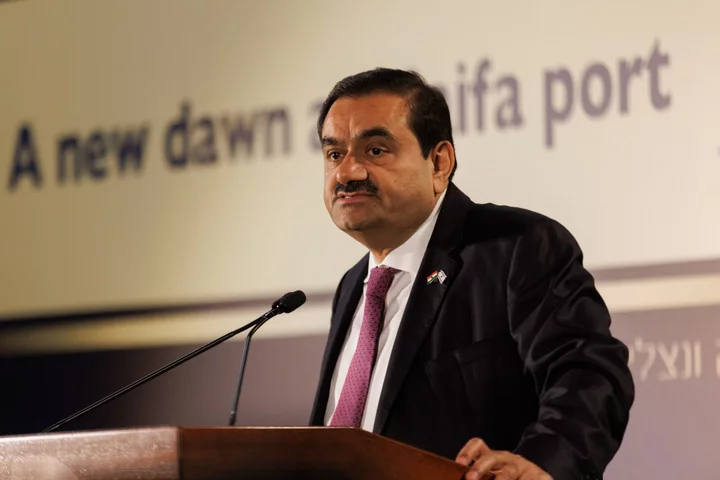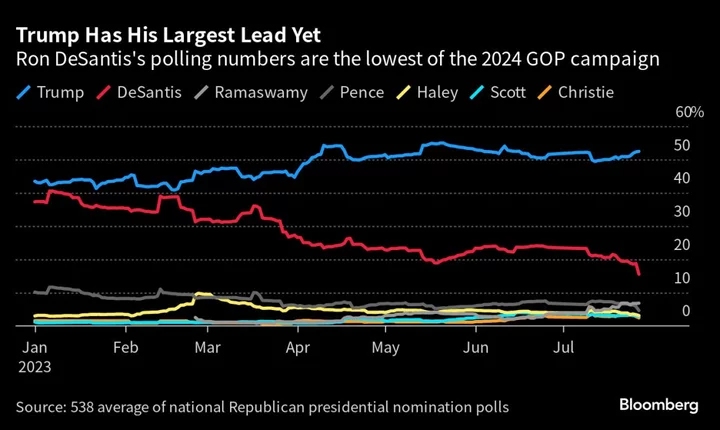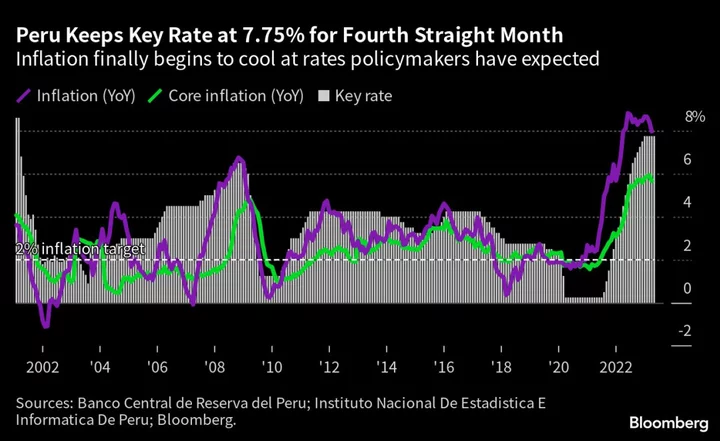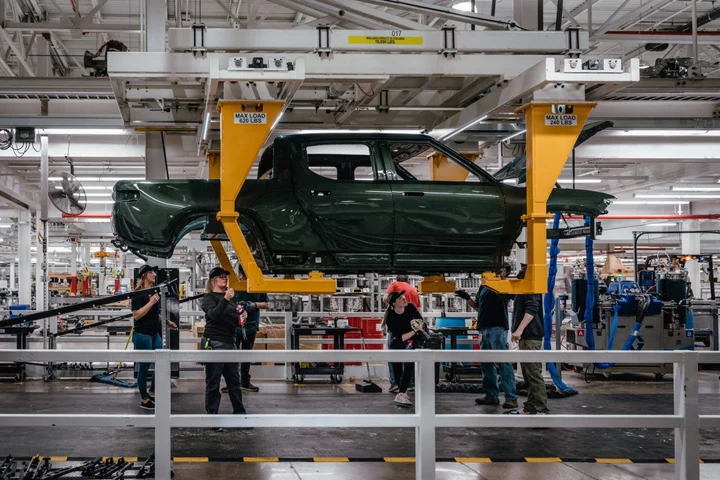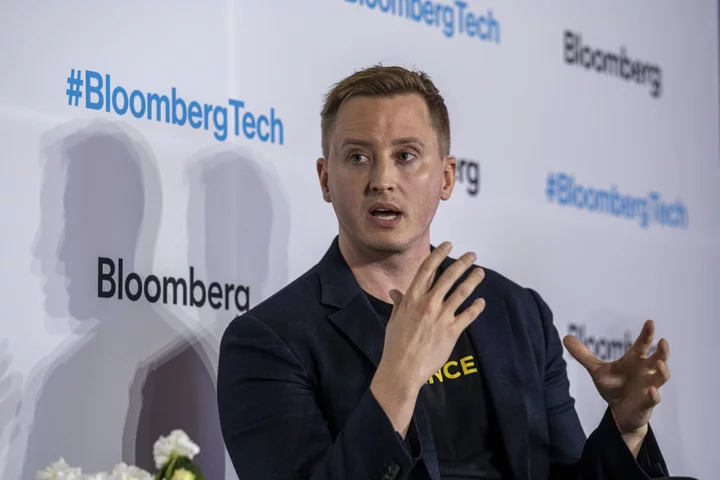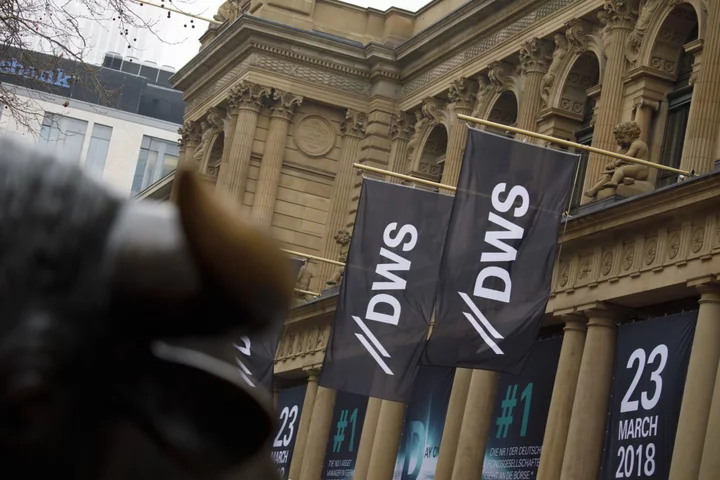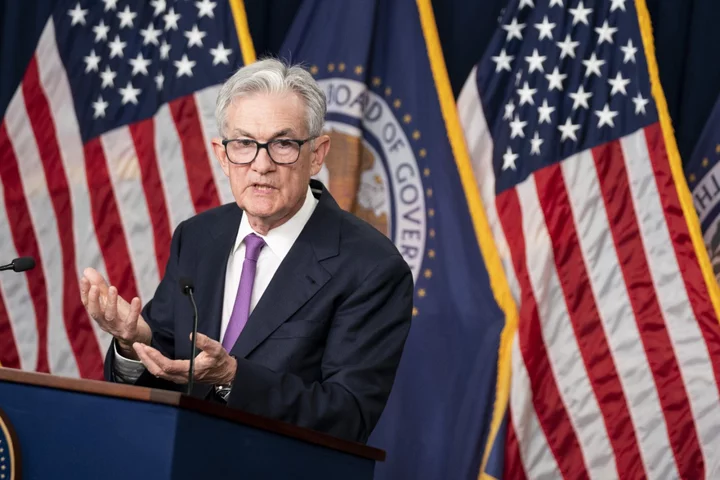US President Joe Biden and Indian Prime Minister Narendra Modi announced a series of defense and commercial deals designed to improve military and economic ties between their nations during Thursday’s state visit at the White House.
General Electric Co. plans to jointly manufacture F414 engines with state-owned Indian firm Hindustan Aeronautics Ltd. for the Tejas light-combat aircraft, as part of an effort to improve defense- and technology-sharing as China becomes more assertive in the Indo-Pacific.
Biden and Modi also announced new defense collaborations, including progress on an order for MQ-9B SeaGuardian drones made by General Atomics, and an agreement that will allow American Navy ships to undertake major repairs at Indian shipyards.
And the two leaders debuted a series of semiconductor deals designed to take advantage of Indian subsidies intended to bring advanced technology manufacturing to the South Asian nation.
“We are doubling down on our cooperation to secure our semiconductors, our semiconductor supply chains, advancing open RAN telecommunications networks, and growing our major defense partnership with more joint exercises, more cooperation between our defense industries, and more consultation and coordination across all domains,” Biden told reporters following the talks.
Micron Technology Inc. is investing more than $800 million toward a $2.75 billion semiconductor assembly and testing facility in India, while Applied Materials Inc. will announce a new semiconductor center for commercialization and innovation. Chip manufacturer Lam Research is announcing a training program in India for up to 60,000 engineers.
“We have transitioned today to a relationship involving transfer of technology, co-development and co-production,” Modi said, heralding the GE deal as a “landmark agreement.”
Read More: Modi Looks to Solidify India’s Tech Ambition With US Visit
Indian companies also plan more than $2 billion in projects in the United States, including a solar manufacturing facility in Colorado, steel plant in Ohio, and optic fiber facility in South Carolina.
The accords unfold as India has sought to increase its engagement on the global stage both diplomatically and economically, senior US officials, who detailed the plans before their official announcement on the condition of anonymity, said in a call with reporters.
The announcements — which also include closer cooperation between the countries’ space programs as well as efforts by the US to make visas easier for Indian workers to obtain — occur on a day of elaborate pageantry for Modi, who is attending his first ever official state visit at the White House.
Upon his arrival Wednesday evening, the Bidens presented Modi with a vintage American camera, a book of American wildlife photography, and a signed first edition of the collected poems of Robert Frost.
When the prime minister arrived to address a joint session of Congress on Thursday afternoon, he entered the chamber to chants of “Modi! Modi! Modi!” from visitors in the galleries. He received standing ovations as he praised the US-India relationship, reiterated Indian positions including on reform of the United Nations, and hailed the contributions of Indian-Americans as well as his own government’s successes.
On Thursday evening, hundreds of celebrity guests and business executives — including Alphabet Inc. Chief Executive Officer Sundar Pichai and Microsoft Corp. CEO Satya Nadella — are to gather under a tent on the South Lawn of the White House for a vegetarian-forward meal prepared by guest chef Nina Curtis that includes grilled corn salad, stuffed portobello mushrooms, and rose and cardamom-infused strawberry shortcake.
Musical performers are include Grammy Award-winning violinist Joshua Bell and Penn Masala, a South Asian a capella group founded by University of Pennsylvania students.
Yet the hope in both New Delhi and Washington is that the gathering portends deeper and lasting relations — particularly because the two nations have a long history of announcing cooperation agreements that fail to come off.
Additional announcements include Indian plans to sign the Artemis Accords, a framework signed by two-dozen nations — but not Russia or China — governing joint missions and civilian space exploration. Modi met with SpaceX chief Elon Musk in New York on Tuesday. NASA and the Indian Space Research Organization have also agreed to a joint mission next year to visit the International Space Station.
Read More: Musk Says Tesla Hopes to Invest in India After Modi Meeting
The pacts showed that “even the sky is not the limit,” Modi said.
Senior administration officials speaking on the condition of anonymity to preview the announcement said Indian officials were pleased with their efforts to cut through red tape that had inhibited past deals, and said they were determined to make sure the agreements announced Thursday actually came to fruition.
Still, there were also expected to be moments of tension in the meetings between the two leaders. India has been reluctant to impose sanctions on Russia since the invasion of Ukraine, and has aggressively purchased Russian oil. The South Asian nation received 1.96 million barrels a day from Russia last month, 15% more than the previous high in April, according to data from Vortexa Ltd.
Read More: Modi ‘Really Surprised’ by Charges of Democratic Backsliding
White House National Security Council spokesman John Kirby told reporters earlier this week that the US hoped India would continue to abide by the price cap on Russian oil that Washington helped to negotiate.
Modi said Thursday his country was “completely ready to contribute in any way we can to restore peace” in Ukraine.
Biden also repeatedly raised the issue of democratic values as the leaders met, amid pressure from human rights activists to raise concerns over the crackdown by Modi’s government on reporters and opposition leaders.
“The whole world has a stake in our success, both of us, and maintaining our democracies makes us appealing partners and enables us to expand democratic institutions across around the world,” Biden said.
Why India Walks a Tightrope Between US and Russia: QuickTake
Modi bristled at the suggestion that there was discrimination by his government, saying he was “surprised” by the criticism.
“Regardless of caste, creed, religion, gender, there’s absolutely no space for discrimination,” he said.
--With assistance from Iain Marlow and Billy House.
(Updates with Modi’s address to Congress, in 12th paragraph.)

